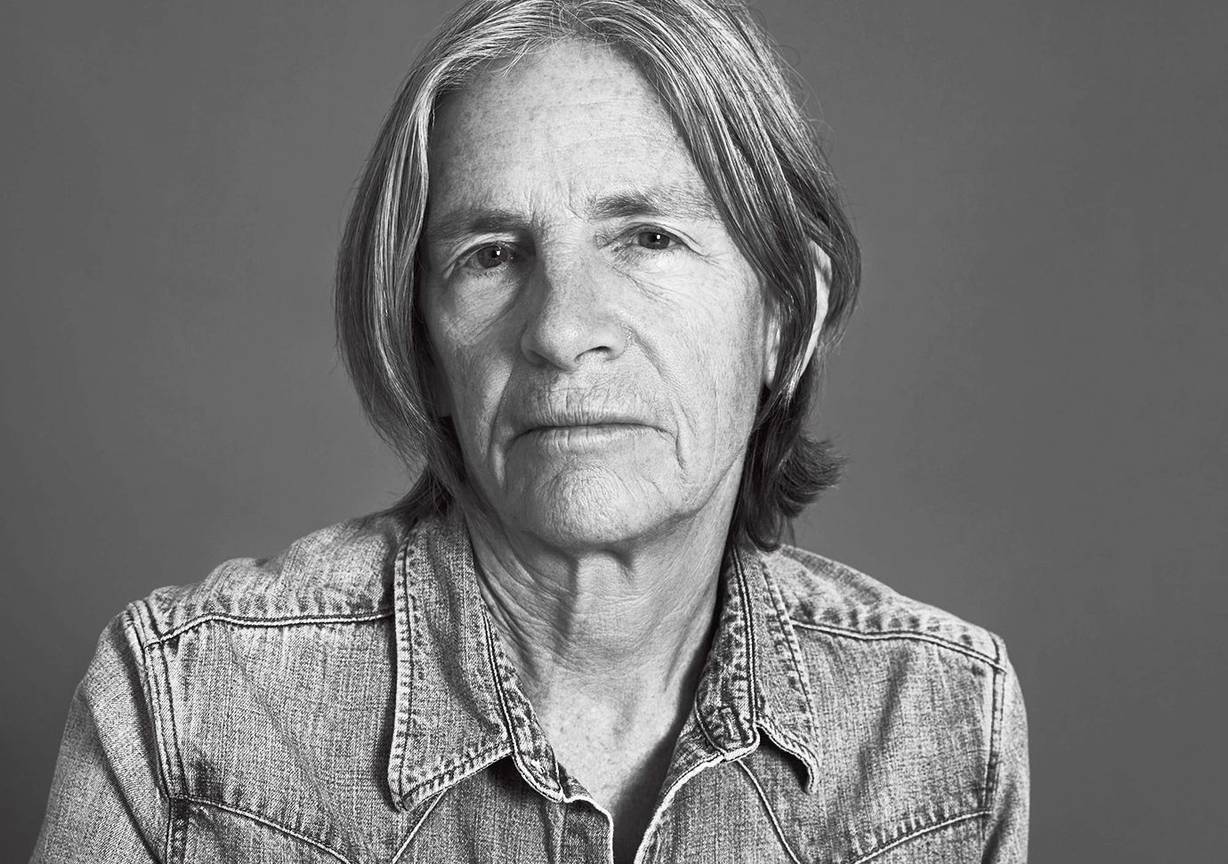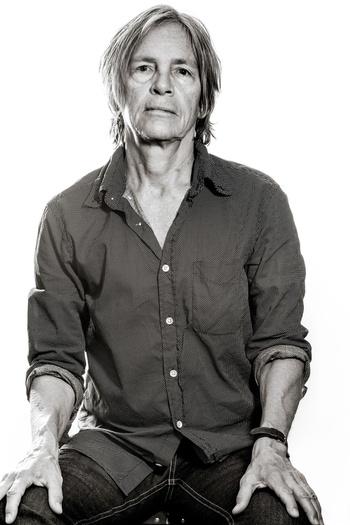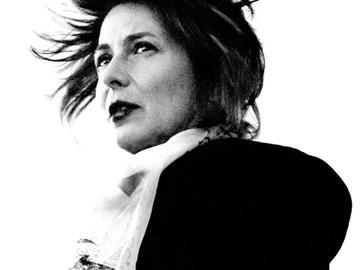Eileen Myles is impossible to pigeon-hole. First of all, the New York writer and performer, whose star shines more brightly at 70 than ever before, is non-binary and uses the pronouns "they" and "them" instead of "she" and "her". But they are also a legendary, badass punk poet, a "dyke" we would like for president, and an inspiration to the queer community, women, and lovers of uncompromising poetry all over the world.

© Shae Detar
| Eileen Myles, American poet-president.
Eileen Myles: from poet to president
Who is Eileen Myles?
- born in a Catholic working-class family in Boston in 1949
- at the age of 24, moves to New York to become a poet and starts attending poetry readings, where they meet Allen Ginsberg
- does all kinds of jobs, from working at a jazz bar to being a foot and bike messenger
- becomes an assistant to the poet James Schuyler
- publishes their first collection of poetry, The Irony of the Leash, in 1978
- publishes their first novel, Chelsea Girls, an account of their own identity and sexuality during their early years in New York, in 1994
- Chelsea Girls is reissued in 2015, sparking huge interest by a new generation of readers
- I must be living Twice collects their poems from 1975 to 2014
- Amazon's TV series Transparent bases a character on them
- publishes their new collection of poems, Evolution, in 2019

© Shae Detar
| "I am many and I am different genders all the time, and I realized that “they” held that as a pronoun."
I think I was always ready to be in a different, maybe even a bigger room,” Eileen Myles says when we ask them whether the recent spike in interest in their work has taught them anything about themselves. “In a weird way I’m not surprised and that’s nice to know.”
Eileen Myles has been writing for more than forty years. Their first collection of poems, The Irony of the Leash, was published in 1978, four years after they had left the Irish Catholic, working-class Boston of their youth and moved to New York at 25 years old with the explicit intention of becoming a poet.
It was a time of exciting encounters in small communities – they would attend poetry readings, continue the party at Allen Ginsberg’s apartment, bump into Bob Dylan and Andy Warhol, and live a few floors down from Blondie.
Chelsea Girl
But it was also a time of artistic ambition and lousy jobs, of intoxication and awareness, of obscurity and a longing for light. A time in which Eileen Myles found the voices and words to conceal and to expose, to joke and to be brutally honest, to speak the raw, messy truth and yet at the same time to shift the perspective on that truth. To find their identity and to confront the world, to break and to build, to breathe, to be enfleshed, to change, to falter and to persist, always to persist, to the point of bleeding.
They captured what was happening around and inside them into their first novel, Chelsea Girls, which was published in 1994. After having published about twenty books in a variety of genres, it was the reprint of that book – and the publication of I Must Be Living Twice, a selection of their poems from 1975 to 2014 – that fascinated the world far beyond the poetry scene a few years ago.
Outsider
With a little help from celebrities like Kim Gordon, Beth Ditto, and Lena Dunham, and from Transparent, Jill Soloway’s Amazon TV series that loosely based its poet and lesbian literary professor Leslie Mackinaw, played by Cherry Jones, on Myles.
“It’s a little alarming, really,” Eileen Myles laughs about that recent rise in fame. “It’s like the rooms changed out from underneath me. I’m continually surprised by the extent to which my work and even my being is recognized. I probably have more power in terms of what I do and how I do it now. But at the same time, there are always limitations. So I might think: ‘Now I’m going to write this text for this publication’, and it gets rejected as quickly as ever. (Laughs) I’m still an outsider in a big way, at least in the American literary establishment.”
X marks the spot
“Poetry was the first place I saw how radical language could be,” Eileen Myles says. “It was just so spatially different. It felt like I could inhabit the space where there weren’t words as much as where there were. So there was a way in which all those white spaces always appeared to be an invitation to celebration, to freedom. Even though there were apparently rules in poetry, to me it seemed that poems just went so many different ways, that poetry was really changeable.”
Talking about change: you once said that “reading is a trans experience”?
Eileen Myles: I think reading is kind of a cyborg experience. It’s definitely an extension of the body, like a doorway into bodies that I want to occupy, or a reinforcement or an emendation of the one that I already do occupy. It seems like the self extending itself endlessly in a way. As a queer female, as somebody who identifies as trans, I think I’ve felt that I have been changing who I am or expanding it all my life.
Your language reflects that. Dealing with politics and the personal, poetry and protest, daily life and the body, it is both intimate and elusive. Like life, it is transforming, moving all the time. Like yourself, when you do readings.
Myles: Oh yeah. You know, the poetry world has many prohibitions. You shouldn’t move it too much and you certainly shouldn’t indicate with your body what you are saying, because that would mean you are an entertainer or a performer. But I have always been a person who talked with their hands, would jump up, and move their body. That’s what I do.
One of the things I have acquired with acquiring a reputation is giving myself permission – even as a female – to be ugly, to not worry about looking good when I read, to not conform to a certain body language. When I read my work, it is this mind making these claims, and I will move. So why wouldn’t my text?
Anger is often the thing that impels me forward, past things that hold me down.
Words are able to throw things into existence. In that sense, writing can be a way of righting wrongs, giving something the right to exist. When I read your work, I often feel this idea and this sort of urgency behind it. Of talking and naming, writing and righting.
Myles: Absolutely. I often feel like it’s on me to somehow adjust where the narrative is going, like I have been deputized to do this and that my writing has that purpose as well. I think reactiveness creates meanings that either are intentionally righting wrongs or putting something out there that I have never seen and that I think necessarily must be in the world.
Opening spaces to these experiences seems to be what writing accomplishes continually.
With writing and righting also comes the necessity to speak.
Myles: In a kind of a self-preserving way, there have been institutions, incidents, histories that have compelled me to be silent. In an extinguishing way, in a way that says that you’re not here, that you’re not present, that you don’t exist. You know, I have dual citizenship: I’m American and Irish.
When I went to Ireland to organize that, I found genealogical records of my family in the library, and I stumbled across this small piece of paper of my grandfather’s birth. The birth record was signed by his sister, who obviously couldn’t write, because it was just an “X”.
That “X” was so meaningful to me. It was such a strange, beautiful mark from the 19th century and at the same time it was a part of me. It was very moving. I think all writing is just that mark.
As a queer female, as somebody who identifies as trans, I think I've felt that I have been changing who I am or expanding all my life
I am Legion
The X is a reference to the non-binary identity that Eileen Myles identifies with. I am many. One consequence of this collective identity is their preference for the personal pronouns “they”, “them”, and “their”. “These pronouns were in the world and were being taken up by mostly younger people. My first reaction was that it didn’t seem intuitive, awkward, not helpful.”
So what changed that? What made you want to put your collective identities into these words, and sort of make it official?
Myles: It was a sudden realization. I was brought up Catholic. So there were stories from the Bible I was very familiar with. One spoke about somebody who was filled with demons, and Christ was asked to exorcise this person.
And the first thing he did was speak to the demons: “Tell me your name.” And the demon said: “My name is legion.” And I never understood what that meant, as a child I thought it meant something military: “But why would there be Roman troops inside of this person?” And suddenly I realized that it meant: I am many, I am plentive. And that that was considered wrong. That one should be precise, that one should be male or female, that one should be one, not many. And I just didn’t agree with that.
I knew in my life and in my living, in my day, in my writing, I am many and I am different genders all the time, and I realized that “they” held that as a pronoun.
What were the reactions?
Myles: It was so funny to watch it get deployed publicly and socially. It’s hard to know how much to police it, you know. I made my publicist use it first, and I had to fight a little bit with the publisher to get them to use it. When I would do a reading and the person who was introducing me would explain it, I thought: “It doesn’t have to be that weighty.” And then, in what kind of situations do I correct my friends? Or my therapist? I told him I like “they”, but he persists in calling me “she”. So do I correct him in the middle of therapy? (Laughs)
Maybe there will come a day where I just won’t care and I’ll let it undo itself. But for now, it is important to me. I’ve put up with all of my friends’ weddings, the births of their children, all these life markers in other people’s lives, and I’m simply contending that this is one of mine.
Besides being an apt way to describe that plurality, I wonder if “they” is ever a lonely or lonesome word?
Myles: “A lonely word,” that’s beautiful. And you’re right, I suppose it can momentarily seem a little disembodied. Because in its featurelessness it can feel like somebody has been left. I mean, I would say I don’t ever miss the “he”, but I do miss the “she” from time to time. Sometimes I think: “Why can’t I let her be here?” There are always feelings that are poignant and regretful.
Anger is an Energy
Eileen Myles not only represents a plurality in themselves. The world outside their body also seeps in: political decision making, social injustice, and discrimination based on gender, race, class…also burn holes in their work, which uses language to try imbue with dignity anybody who feels unworthy.
“Unworthiness is so interesting as a feeling. Part of the reason why people are okay with the number of refugees in the world is that somehow they are looked upon as being of some substance in which refugee status suits them. You know: the slave is a slave because he is made of slave material. The refugee is somebody that knows how to not have a home. While I need to have a home, I need to be free. That also implies that my freedom is contingent on their slavery, my home is contingent on their homelessness. We’re all complicit on some level.”
Is anger a driving force in your work?
Myles: Absolutely. It’s sometimes just simply anger at myself for realizing to what extent I’m accepting the mantle of unworthiness. I guess the thing I love about anger is that it breaks down these constructed spaces, these psychological gaols that determine what level we’re at, who we are, and what we’re to do.
Anger is often the thing that impels me forward, past things that hold me down. To counter the idea that they don’t want to hear from “dirty you”. It’s so weird, the ways in which I feel that I’m not entitled to speak and to be and to have and to know and to move and to… It’s intense.
So intense that in 1992 – after having written “An American Poem”, an astonishing text that addresses the AIDS epidemic and its social fallout, while you pretend to be a Kennedy – you decided to actually run for president. Was it hard to find that voice and the confidence to speak for other people?
Myles: No, and in fact I feel that I learned something from that gesture. I knew that I, an openly female candidate, did represent so many people who wouldn’t be represented at all in the campaign. That was verified by how many people would come up to me and say: “You’re the first presidential candidate I have ever met!” Even people who knew me. It was not unlike the first time I ever saw a poet. (Laughs) For a moment, the representation was real.
The artist Zoe Leonard wrote a piece in 1992 in response to my campaign, called “I want a president”, an incantation of all the presidents she wanted – a president with AIDS, a president collecting food stamps… – and one of them was a dyke president, and that was me. That piece was installed on the High Line in New York during an event just before the presidential election in 2016, and she asked me if I might want to update my campaign.
I thought that all I could possibly do, 24 years after running, was to accept the presidency and to leap to today and say where I am and what I will do. So I did just that.
By making the White House a homeless shelter. By starting with a Department of Women. By making education and trains free and by banning cars. By handing out free food, by having a lot of archery, by having ejaculation contests, by dancing... By joking and being brutally honest. By breathing and being enfleshed. By becoming angry and worthy and persisting no matter what.
Because we are many, and Eileen Myles is our president.
Read more about: Brussel , Expo , poëzie , poetry , Passa Porta , LGBTQIA , lgbt , eileen myles , chelsea girls , the trip , evolution




Fijn dat je wil reageren. Wie reageert, gaat akkoord met onze huisregels. Hoe reageren via Disqus? Een woordje uitleg.